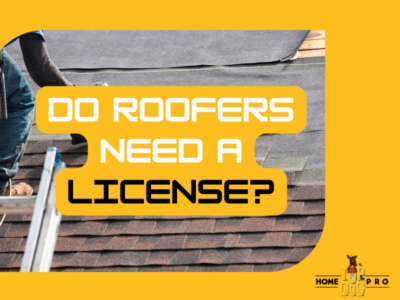Are you considering getting a roof replacement and unsure which roofing contractor to hire?
One of the quickest and most straightforward methods to ensure you make the right choice when hiring a reputable roofing contractor is to evaluate whether or not they are licensed and insured.
However, depending on the state you live in, roofing license requirements can vary. Today, we will cover the roof license requirements and what to know as a homeowner!
First, what is a roofing license?
A roofing license is a certificate verifying a contractor can complete residential or commercial projects. The work includes residential roofing services and repairs up to full-scale commercial roofing projects.
Most states require roofers to obtain a license by passing a residential roofer trade exam. The idea is that this certifies the contractor is reputable and knowledgable, and also provides the public with assurance.
Contractor licenses are standard for most home renovation projects. Within each sub-niche of home improvement like roofing, decks, etc, some associations ensure regulatory standards. The roofing contractors association is an example of one.
State-by-State Roofing License Requirements:
Each state has its own roofing license requirements that help determine the level (if any) a roofing contractor is licensed at. Some states require roofers to obtain a license, while others do not.
For example, in South Dakota, there are currently no state-level requirements. In Virginia, on the other hand, contractors need to be licensed.
To get a full list of roofing license requirements state by state, you can use this resource: Angi State Roofing License Requirements.
Virginia Roofing Contractors License:

According to the Department of Professional and Occupational Regulation Board of Contractors in Virginia, roofing contractors must be licensed with either a Class A, B, or C license. This means passing an exam and the specialty trade license depends on the years of experience (Class A = 5 Years).
As the qualified individual for your specialty trade license, you must show two years of experience for a Class C certificate, three years of experience for a Class B license, and five years of experience for a Class A license. You must pass an exam to be eligible for the license.
How to find a roofing company:
Most homeowners looking to hire a home improvement contractor of any type will often rely on the Internet or word-of-mouth referrals to hire a contractor.
For roofing, social media, asking a neighbor, and searching online are the only methods for finding contractors. Companies are easy to find, but you should vet them even further.
Starting, be sure always to do the following:
- Look at their reviews. While reviews are not an end-all, they give you a general feel for the roofing contractor you are considering.
- Ask for the whole company name and physical address. Avoid companies that don’t have a fixed address; a PO Box is a cause for concern.
- Ask if they are insured (liability, workers compensation insurance, etc).
- Ask if they are a licensed roofer.
You read how to find the best roofing contractors in your area here. If you find a contractor and want to know more, you can always look up their license using the steps below!
Look up your roofing contractor:
If you are unsure whether the company you are considering hiring has a roofing license, ask them for the info, or you can look it up.
Most state gives homeowners the ability to look up licensed roofers. In Virginia, for example, homeowners considering hiring a company can visit the License Lookup website and search for the company name.
For example, by searching Top Dog Home Pro, you can see

For most states, roofing contractors need to have some form of business license or a roofing license, or at the very least, be registered. In South Carolina, for example, a roofing contractor falls under the “Residential Specialty Contractor” category, which doesn’t require a state license.
Other Related Roofing Articles:
The Verdict –
The moral of the story is you should always s hire a roofing contractor with a valid construction or roofing license. Some of this can seem confusing so it is best to see what your state or local area recommends for hiring roofing contractors. While the specifications vary from state to state, roofing contractors working in states that don’t require a roofing license know how important it is to be licensed/ or get some form of documentation for their roofing business.
Some companies have commercial and residential licenses, but as a homeowner, your principal focus should be hiring residential contractors with a home improvement license. Roofing work is highly technical, meaning you could have many issues if not done correctly.
Unfortunately, some roofing companies will use poor sales techniques and perform bad roofing jobs. This is common in areas impacted by major storms, so for consumer protection, always be aware of roofing contractors that “Chase Storms.”
In closing, while most reputable roofing contractors will have licensing and residential contracting experience, it is always a good idea to do your due diligence before hiring. This is why Top Dog Home Pro of Virginia has assembled an entire learning center for our customers.


 All The Gutter Sizes & Styles To Know About
All The Gutter Sizes & Styles To Know About